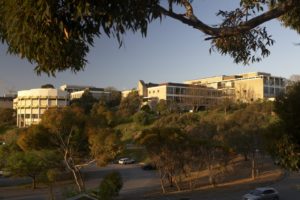 Student-led research into cancer prevention, body image, groundwater and medieval cultures are among the winners of Flinders University’s 2013 Best Student Paper Awards.
Student-led research into cancer prevention, body image, groundwater and medieval cultures are among the winners of Flinders University’s 2013 Best Student Paper Awards.
A record nine higher degree research students – Jean Winter, Belinda Lunnay, Melissa Atkinson, Linda Isherwood, Matthew McDowell, Ashley Slatterty, Leanne Morgan, Stefano Bona and Melinda Graefe – have all received a cash prize of $1000 for their research efforts, with an official awards ceremony to be held in the new year.
Announced on December 19 by the Deputy Vice-Chancellor (Research), the annual program aims to recognise and reward excellence in student research across Flinders University.
Ms Winter, a PhD candidate and research assistant at the Flinders Centre for Innovation in Cancer, was awarded the prize for her research into how starchy foods such as potatoes and green bananas can reduce genetic damage done to the colon by eating red meat.
As part of her studies, Ms Winter and a team of Flinders researchers have discovered that resistant starch can reduce a certain type of DNA damage in the colon following meat consumption.
“We’ve found that when you eat red meat you get a significant increase in this type of DNA damage which, left unrepaired, can lead to mutations and ultimately colorectal cancer,” Ms Winter said.
“But we’ve changed the fermentation properties in the colon and delivered starch directly to the colon where it converts into short chain fatty acids which in turn help offset the DNA damage.”
Ms Winter said the awards were a great way to showcase Flinders research calibre.
“I was really excited when I found out I won, and I also think it’s a great way to encourage students to write papers and to get them into journals,” she said.
Flinders Deputy Vice-Chancellor (Research), Professor David Day, applauded all nominees for their contribution and commitment to research.
“The range and quality of applications received this year has been particularly impressive,” Professor Day said.
“These students are making meaningful contributions to the pursuit of research excellence, reflecting the Flinders way, and for that they should all be congratulated,” he said.

